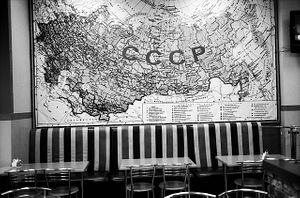Some weekend reading:
A Collapse, or Something Like It: Twenty-five years ago — December 26, 1991 to be specific — the Soviet Union ceased to be. The union’s collapse, conventional wisdom says, was a surprise to the West and marked the end of the Cold War. In 2016, conventional wisdom seemed largely meaningless across the board. Now, more than ever, it seems prudent to thoroughly revisit the collapse of the Soviet Union and the aftermath. Foreign Policy has pieces from six experts which aim to start that conversation, two in particular focus on Central Asia: Nargis Kassenova, an associate professor and director of the Central Asian Studies Center at the Kazakhstan Institute of Management, Economics and Strategic Research and Alexander Cooley, Director of Columbia University’s Harriman Institute.
Kassenova charts how Central Asia remains a region tethered to Moscow in many ways. Kassenova suggests, “it’s time for Central Asians to abandon the type of self-victimization typical of colonized people and truly embrace their countries’ independence.” Cooley debunks the claim that the region is reclusive and fingers the West for turning a blind eye to the networks, particularly offshore financing networks, which enabled regional autocrats to enrich themselves.
Russia’s Colonial Allergy: The history of the Russian Empire features the gradual, and at times violent, expansion of lands under Russian rule. One could deem the successive battles and ultimate surrender of the Khanates of Kokand and Khiva and the Emirate of Bukhara in the late 19th century to Russian dominance as colonization. But as Alexander Morrison notes in an excellent piece for EurasiaNet this week:
…any historian of the Russian empire knows that one surefire way today to drop a brick in a conversation with Russian colleagues is to refer to ‘Russian colonialism.’ With rare exceptions, you will be met with a baffled, if not offended, response: “Colonialism? What Colonialism? Russia has never had colonies.”
This “allergy” as Morrison terms it, didn’t always exist. In the days when colonies were the mark of a great power, Russia used the term just as the British did. The Bolsheviks were anti-colonial but who gives up an empire? “Colonialism” and “imperialism” shifted from being universal terms (encompassing Russian territorial acquisitions and domination) to being applied solely, and negatively, to the British and the French empires. That linguistic legacy lives on.
Mirziyoyev and an Uzbek Glasnost: In a commentary for the Carnegie Moscow Center this week Arkady Dubnov parses through what many regional observers have: the tea leaves of the nascent Mirziyoyev era in Uzbekistan. “Mirziyoyev’s challenge going forward will be to separate the narrative of his regime from the negative elements of Karimov’s legacy,” Dubnov writes. Uzbekistan is entering a new period, certainly, but the pieces of the machine that is the state were forged in the Karimov era and that cannot be overlooked. Change is not impossible, but may prove difficult due to “the hydra of the entrenched elite.”
The Fading of the Turkmen Father: What’s the shelf-life on cult of personality? In Turkmenistan it seems to be a decade. Anton Lomov and Christopher Rickleton, have written a fascinating exploration of the death of a cult of personality for the AFP. Saparmurat Niyazov, Turkmenistan’s first and founding president, built one of the most eccentric cults of personality in modern memory. His visage was on everything from watch faces to vodka bottles and a golden statue of Niyazov, his arms upraised, used to rotate to face the sun in downtown Ashgabat. In the decade since Niyazov’s death — on December 21, 2006 — his cult of personality has been slowly peeled back and replaced by that of his successor, Gurbanguly Berdimuhamedov. But nostalgia, of a sort, remains.

































